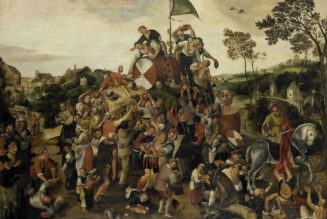I can never keep track of what each of the four temperaments means:
-
Choleric (always makes me think of Clorox bleach)
-
Phlegmatic (sounds like you’ve got something stuck in your throat)
-
Sanguine (I have no idea why, but I think of oranges)
-
Melancholic (Smashing Pumpkins. You know if you know.)
My wife and I had a most excellent conversation this week with Laraine Bennett, someone who knows much more about this important topic than I do. She and her husband literally wrote the book on it (multiple books, actually).
But before you go listen to that, read this first:
This post is about dead people.
One day you’ll be dead, so this kind of applies to you, too.
Over the years I’ve occasionally been asked to provide narration for audiobooks.
It’s terribly difficult work, but at the same time something I enjoy.
It’s difficult because I get exhausted from talking. Ironic, I know, given that a significant portion of the way I provide for the family is by talking, talking, talking.
When we used to host three hours of radio five days a week, it took quite a bit of effort. There were times, often even months on end, when Jennifer wasn’t my co-host and I would literally sit in a room and talk out loud to myself for three hours straight.
Granted, I’d get phone calls and interview guests, but there were days we had neither, and it was completely up to me to prevent the dreaded dead air. And I know people were listening on their radios, but on my end, I was the only one in the room and it felt very odd to have three-hour conversations with myself.
Given all this, I take the narration and production of audiobooks very seriously because — even if I didn’t write the book I’m narrating — I’m responsible for making listening to the book an enjoyable experience for others.
Earlier this year, the stakes were raised even higher when I was asked to narrate two different books by authors, now deceased, on a topic that makes many people — both Catholics and non-Catholics — run away screaming.
Purgatory.
WAIT!!!
See, I just lost half of you. Good grief.
Well, for those of you still here, given that today is the Feast of All Souls in the Catholic Church, I want to share some of the new insights I learned from narrating those books, and how they’ve impacted my life in the ensuing months.
By the way, if you’re interested in learning more about the afterlife and purgatory and how to avoid hell and purgatory, the books I narrated are both available on Audible and elsewhere. The first is called The Afterlife by Don Dolindo Ruotolo. The other is The Truth About Purgatory and the Means to Avoid it by Fr. Martin Jugie.
Narrating these two books, both written before I was even born, vastly increased my understanding and knowledge of this sometimes somewhat confusing subject.
So with that, let’s dive in, first by looking at Purgatory, which the Catholic Church also refers to as “The Final Purification.”
In paragraph 1030 of the Catechism of the Catholic Church, it says, “All who die in God’s grace and friendship, but still imperfectly purified, are indeed assured of their eternal salvation; but after death, they undergo purification, so as to achieve the holiness necessary to enter the joy of heaven.”
What does that mean, though, to be purified? Didn’t Jesus already die for me? Am I not already clean by the Blood of the Lamb?
Well – Yes, Jesus died for you. But let me ask you a sincere question:
Have you sinned — even once — since receiving His salvation?
This is where Protestants and Catholics often get divided in the argument over once saved always saved. I don’t buy that, especially since even St. Paul wrote in 1 Corinthians 9:27, “I pummel my body and subdue it, lest after preaching to others I myself should be disqualified.”
Why would St. Paul worry about being disqualified if it was impossible to lose what Jesus has won for us?
That’s a conversation for another day, I suppose, but if you’d like to dive more deeply into that discussion, this is an excellent thorough explanation.
So then let’s assume you’re willing to believe that you could lose what Jesus won for you. Let’s assume you believe what the Catholic Church teaches that we could damn ourselves to hell by breaking away from God in our persistent sin.
This is why Jesus himself gave his apostles the ability to forgive sins in His name. We see this in John 20:21-23 where Christ says, “As the Father has sent me, even so I send you. . . . Receive the Holy Spirit. If you forgive the sins of any, they are forgiven; if you retain the sins of any, they are retained.”
Note that Jesus didn’t give this ability to all his disciples. He gave this ability to forgive to those who were His first priests – the apostles.
Again, we could easily diverge into a conversation on authority here, but we’ll remain on target (which again, is to talk about Purgatory on this Feast of All Souls).
What the early Church Fathers believed, and what the Catholic Church teaches to this day is that if you’ve not been reconciled of your venial sins to God through Confession, but then die in grace and friendship with God – meaning you’ve committed no mortal sin that has not been confessed such as adultery, fornication, stealing, etc., – then you can expect at your particular judgment to enter purgatory.
Purgatory is what the Catholic Church calls the final purification of those who are guaranteed entrance to heaven but need to be purified before entering into the perfection of God.
Why is this necessary?
Again, if we sinned, we are not perfect. That logically needs to be cleared up before we can be inserted into perfection.
God is perfect and can have no imperfection within Him.
I’ve always explained it this way: Pure Gold is Pure Gold. You can’t have a block of gold, sitting in the vaults at Fort Knox, with a big ol’ branch or a dirty sock stuck in the middle of it, and then still call it “Pure Gold.”
To make that gold block with a sock in it pure again, you’d melt it all down in a consuming fire that would burn away the sock or the branch or whatever was dirtying up the gold. You could then add that gold to the biggest block of gold in existence (let’s call that big block GOD) and then it would be considered purified.
If you’ve got some dirty laundry about you right now, and went out and got hit by a bus, you’d need that dirty laundry burnt out of you before entering God’s perfect presence.
This is actually a considerable gift of mercy. God’s not saying, “One venial sin? To hell with you!”
What He’s saying is, “I love you, despite your venial sin. Therefore, in my mercy, I’ll grant you admission to my kingdom once you’ve been purified of this fault.”
You may be saying: “Waitaminute. You just made a point of classifying the sin as venial sin.”
Good catch.
For a sin to be mortal it must meet these three conditions:
-
It’s a grave sin (adultery, fornication, murder, etc.),
-
You know it’s a grave sin, and,
-
You do it anyway.
Remember when people used to live together out of wedlock and people called it, “living in sin”?
That’s because it was.
And still is.
And people who persist in living in grave sin absolutely cannot expect to enter heaven or even purgatory. They’ve already rejected God through their grave sin.
So let’s be clear here: purgatory – the final purification of the elect — is completely different from hell and the punishment of the damned. If you’re in hell, there ain’t no getting out. If you’re in purgatory, hell is no longer an option. You’ll eventually end up in heaven. Period.
This teaching has been believed from the beginning of the Church, but was formally established by the Councils of Florence (1431-1449) and Trent (1545-1563) and elsewhere, based on the teaching within 1 Corinthians 3:15 and 1 Peter 1:7 that outline a cleansing fire as reparation for our sinfulness, which is a different fire than the fires of hell.
St. Paul put it this way:
But if someone’s work is burned up, that one will suffer loss; the person will be saved, but only as through fire. (NAB)
And St. Peter says:
In this you rejoice, although now for a little while you may have to suffer through various trials, so that the genuineness of your faith, more precious than gold that is perishable even though tested by fire, may prove to be for praise, glory, and honor at the revelation of Jesus Christ. (also NAB)
St. Gregory the Great explained it this way:
As for certain lesser faults, we must believe that, before the Final Judgment, there is a purifying fire. He who is truth says that whoever utters blasphemy against the Holy Spirit will be pardoned neither in this age nor in the age to come. From this sentence we understand that certain offenses can be forgiven in this age, but certain others in the age to come.
How is this Scriptural, though, you may ask? Or your Protestant friends may ask.
The fact is, it IS in Scripture and has been from the beginning.
In addition to the above quotes from Peter and Paul, there are other even more specific references in Scripture to actually praying for those who have died that they may enter Heaven.
These passages are often ignored because this dude back in the 1500s named Martin Luther got frustrated with the Catholic Church and arbitrarily acted as his own Pope and Magisterium and made the decision (again, on his own to remove) to this critical part of Catholic teaching.
Prior to Martin Luther’s Protestant Revolt, the books of 1 and 2 Maccabees were retained in Scripture, and continue to be so in non-Protestant (i.e., original version) Bibles.
We see this most clearly in the prayer for the dead in 2 Maccabees 12:46:
“Therefore [Judas Maccabeus] made atonement for the dead, that they might be delivered from their sin.”
Even before the aforementioned councils of Florence and Trent, the Second Council of Lyon in 1274 made it very clear that from the origins of the Church, the memory of the dead has been and should continue to be honored through not only intercessory prayers offered up for them in various ways – most especially in the Mass. This benefits the Church Suffering (those souls in purgatory) as our prayers and sufferings on their behalf may help them to be purified, burn up those dirty socks, and help them attain the beatific vision of God.
And it’s not just our prayers that help. Other means the Church puts at our disposal for the reparation of souls in Purgatory are indulgences (we’re not going there in this one), almsgiving, and works of penance undertaken on behalf of the dead.
Here’s how St. John Chrysostom made this recommendation:
Let us help and commemorate them. If Job’s sons were purified by their father’s sacrifice, why would we doubt that our offerings for the dead bring them some consolation? Let us not hesitate to help those who have died and to offer our prayers for them.
Again, this is a very high-level overview of Purgatory. But all that’s to say, while it’s great to celebrate our loved ones who have died, they don’t get wings and become angels, and they don’t necessarily go straight to heaven at the moment of death (though it’s entirely possible if they died in a state of grace and completely free of sin).
It’s better to assume they need our prayers in purgatory and to pray for them, rather than to assume they don’t need our prayers and end up spending extra time there as a result of our ignorance or lack of care. They really want and need your prayers if they are in fact in purgatory. If they’re already in Heaven, or already damned themselves to Hell, God can and will still use those prayers for the good of those who need them.
Again, I recommend the books I mentioned at the beginning of this essay if you’d like a deeper explanation. They’re both quite excellent, though the audiobook narrator leaves something to be desired.
Well, we’re all dying, of course.
Anyway, last week I shared a poem of mine that I recently found. I actually found several others.
This weekend I turn fifty-two, and this one I wrote a couple of years ago still applies:
Fifty
Fifty is sciatica
or whatever it is
That shoots bolts of lightning
To the fleshiest part
Of my right butt cheek,
The part that I can never reach
And makes me so desperate for relief
That I’ll sit on a tennis ball
Awkwardly rolling on it
Like I’m jerking around
a classic arcade joystick
(The game, naturally, would be called
GLUTEUS MAXIMUS,
featuring 8-bit Roman soldiers
racing around a circular coliseum
in tiny chariots lead by tiny horses
that look like tiny brown stick bugs —
But I digress)
And let it dig
Right into the depths of my soul
As I grunt and Yelp
At pains as sharp as scalpels,
These glorious heralds of middle age
And the richness of ailments
Yet to come.
Matt! Matt! Matt! and Jim! Jim! Jim!
Matt and Jim signed up as a monthly subscribers this week. Thanks to both of you!
Also, thanks to new volunteer editors who found where I (intentionally?) screwed up in last week’s chapter of Eighty-Sixed. Remember, paid subscribers and typo finders will be included in printed acknowledgments when/if this novel gets officially published. Thanks to Greg and Sheryl for joining the editorial crew.
And thanks to you for reading. That was lovely of you to do so.
Join Our Telegram Group : Salvation & Prosperity









